The Number 1 Diet to Lose Body Fat, According to an Expert

Keto, Caveman, Mediterranean, Atkins, the list goes on. There are so many diets that people use to lose weight. However, according to one expert, there is one that trumps the rest when it comes to losing body fat. Jeremy Ethier is a kinesiologist fitness influencer with over 6.1 million YouTube followers and one million Instagram followers who uses his science-backed training to help people lose weight and get into great shape. In a viral YouTube video, he reveals that he has found the "number one diet to lose fat." Ethier explains that "it's tough to lose fat, let alone keep it off. But there's a reason why the old saying abs are revealed in the kitchen is still around because it's true." Most of "even the popular diets that work tend to have more cons than pros," he adds. "Today, I'm sharing the size back diet that's simple, easy to stick to, and just works. Here's everything you need to know."
All Fat Loss Diets Have One Goal: Eat Fewer Calories Than You Burn
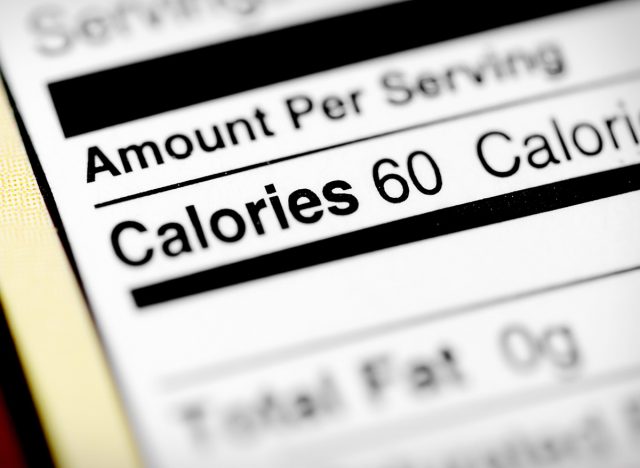
"First off, you must understand that all fat loss diets, regardless of what you call it, have one simple goal: To get you into a calorie deficit where you're eating fewer calories than you burn every day," he says. "But in the diet, I'll be showing you today, rather than cutting out foods, the first step is actually the opposite: Eat more. Not just any food, though."
You Need to Eat More Protein
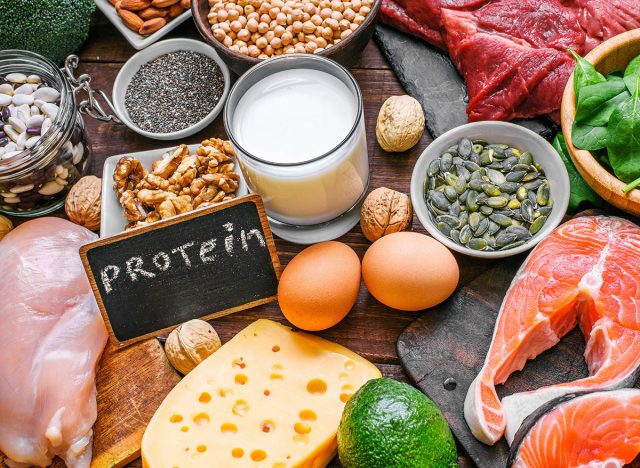
What do you need to eat more of? Protein, he says. "One study published back in 2005 had participants change nothing else aside from eating twice as much protein as they usually do. You'd expect that since they were eating more, they would gain weight, right? Well, here's what actually happened."
After Increasing Protein, People Ate Less Calories

"After bumping up their protein intake, the participants ended up eating 440 fewer calories every day without them even realizing it. And after sticking to their high protein diet for 12 weeks, they lost almost 10 pounds of fat," he says.
This Is Because Protein Is Filling
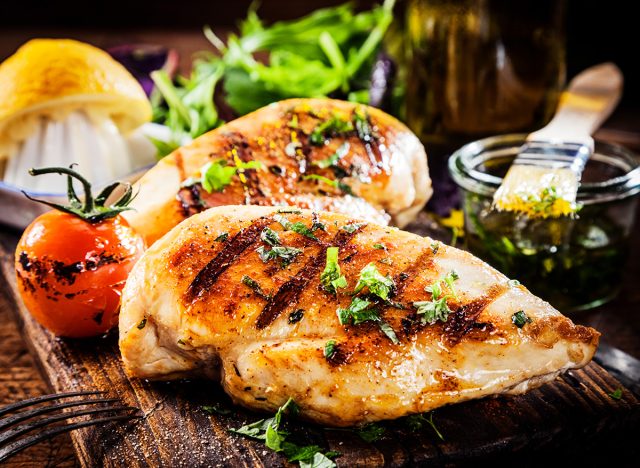
"Now, as for why this happened, part of it is because protein is extremely filling," he says. "Try to eat 400 calories worth of chicken breasts compared to a bowl of cereal, and you'll be shocked with just how long you stay full."
When You Eat Protein, Your Body Will Burn Off Fat for Energy

He says that "the real power of protein is that when you're in a calorie deficit, your body can choose to burn off either fat or muscle for energy." And, "eating enough protein, ideally at least 0.8 grams per pound of your body weight per day, it sends a powerful signal to your body to keep your muscle and burn off your fat for energy."
You Are Also More Likely to Keep Fat Off
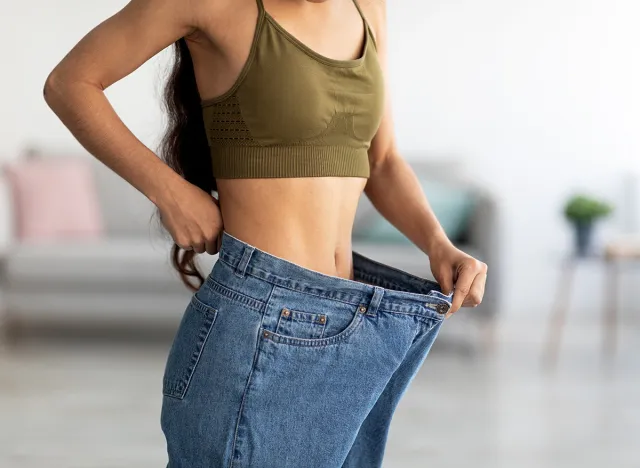
And, you won't just burn fat, but keep it off. "This is why high protein diets not only lead to more fat loss during the diet but have also been shown to be more effective at preventing fat regain after the diet is over," he says. This doesn't mean you have to eat chicken breasts for every meal. He recommends choosing sources you actually enjoy.
Cutting Carbs Will Also Help You Lose Weight
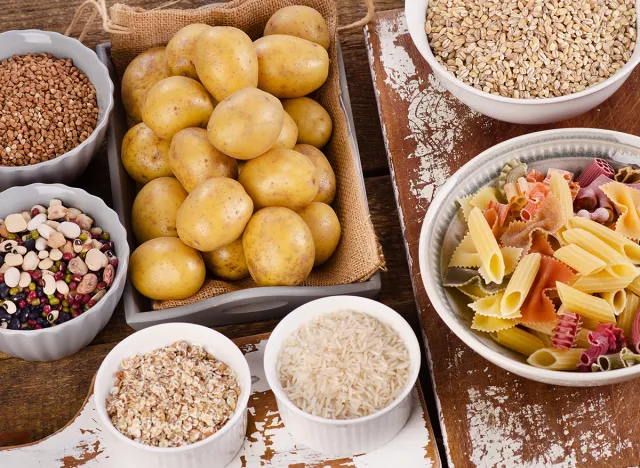
"So we're gonna continue the theme of eating more, but now with carbs," he says, telling a story about how he once cut all carbs, "bread, rice, candy, even ketchup, anything that contains some form of carbs," out of his diet. "By day three of this, I felt like complete crap, super low energy, and my gym performance sucked. Now, after about a week, I actually did end up losing about five pounds, but I was confused because I didn't look or feel any better."
Your Body Will Use Other Sources for Energy

He said that your body will eventually "adapt to this" and learn to use other sources for energy. "But the research is clear: As long as you're in the calorie deficit and eating enough protein, you'll lose fat regardless of if you're eating a ton of carbs or none at all."
He Recommends Saving Carbs for Before and After Workouts
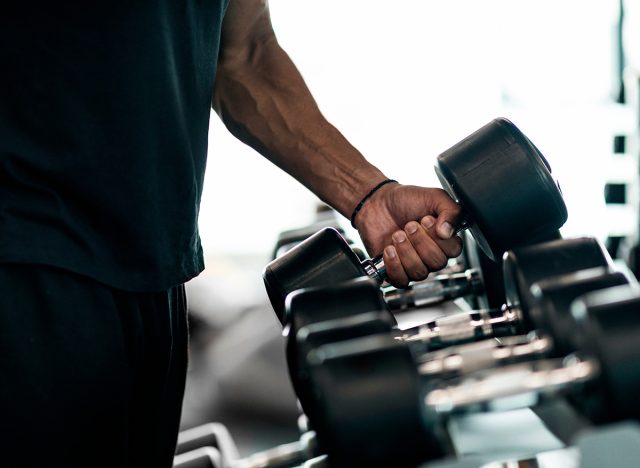
"The calories from carbs add up fast. If you're currently overeating, then you probably will need to cut back on some of your carbs or at least choose less processed carbs that can keep you fuller for fewer calories," he says. "A good strategy I personally use is saving most of my carbs for before and after my workout for when I need the most energy and then add them into my other meals."
Limit Fats
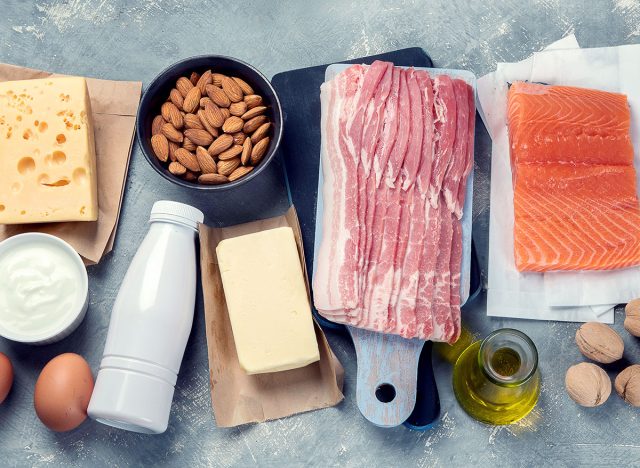
Next up, fats. "Unlike carbs and protein, which only contain four calories per gram, fats are much easier to overeat with because they contain more than double the calories at nine calories per gram," he says.
Don't Cut Them, Just Eat in Moderation

"But just like with carbs, you shouldn't completely cut out your fats," he says. Instead, "just have them in moderation or try to make swaps like using skim milk instead of full cream spray oil instead of cooking oil, choosing less fatty cuts of meats or using a lower calorie salad dressing."
You Will Lose Weight on Strict Diets, But You Are Likely to Gain It Back
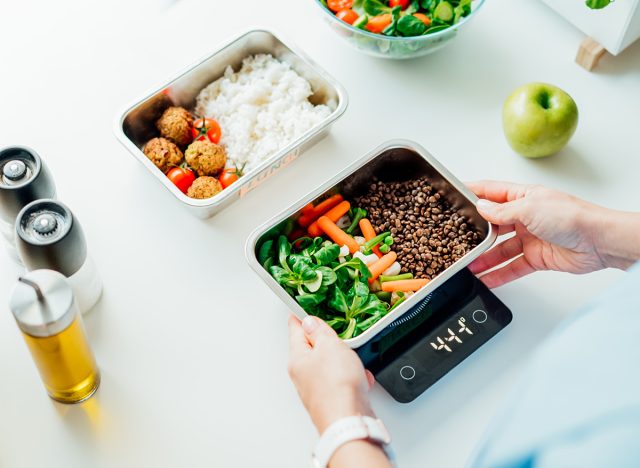
He also talks about a 2021 study that had subjects follow a strict meal plan. "The goal was to put them in a calorie deficit, and they weren't allowed to substitute any of the foods they were given. After ten weeks, the results were great. On average, the participants lost about seven pounds of fat. But here's the catch. As soon as the diet was over, most of them quickly regained the fat they lost. This is because sticking to strict meal plans doesn't actually teach you the proper habits of sustaining fat loss in the long run," he says.
The Number One Diet to Lose Weight: The Balanced Plate Concept
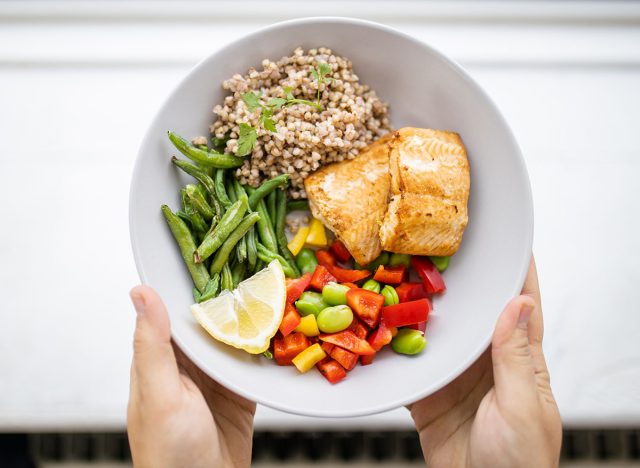
Enter the top diet for fat loss, the balanced plate concept. "Instead of rigidly planning out your meals, most of your meals should look something like this: First, fill a quarter of your plate with a protein source like the ones I showed earlier. Next, to keep you full, fill half of your plate with vegetables and or fruits. And then lastly, balance out the last quarter of your plate with either carbs and or fats," he says. You can also apply this concept when eating out.
RELATED: The Ultimate Guide to Getting Fit as a Pear Body Type
Also, Pay Attention to How Often You Eat

He adds that one factor most people overlook is how often they eat. "I used to think skipping meals was a great idea. If I didn't eat much or just snack lightly throughout the day, I wouldn't be getting many calories in, and that would surely lead to a calorie deficit. But this quickly became a nasty cycle. I'd end up feeling like crap by the end of the day, and as soon as I finally ate something, my stomach would just be a bottomless pit that never got satisfied," he says. "Generally, you should avoid ever getting to a point where you're feeling dizzy, have low blood sugar, and want to eat everything in sight."
You Can Also Try Intermittent Fasting
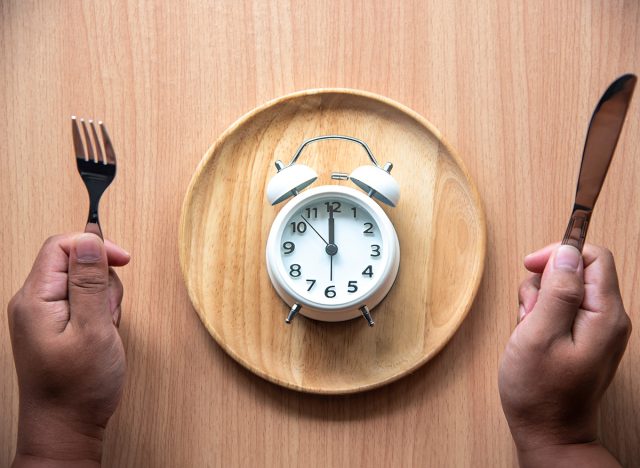
He also brings up intermittent fasting, "where you don't eat your first meal until usually around 12:00 PM and then don't eat anything past 8:00 PM," he explains. "I've personally used this in the past, and it worked really well, not because it's magic, but because it can make sticking into a calorie deficit easier by fitting all your meals into a smaller time window."
He Sticks to a Regular Schedule of 3 to 4 Meals
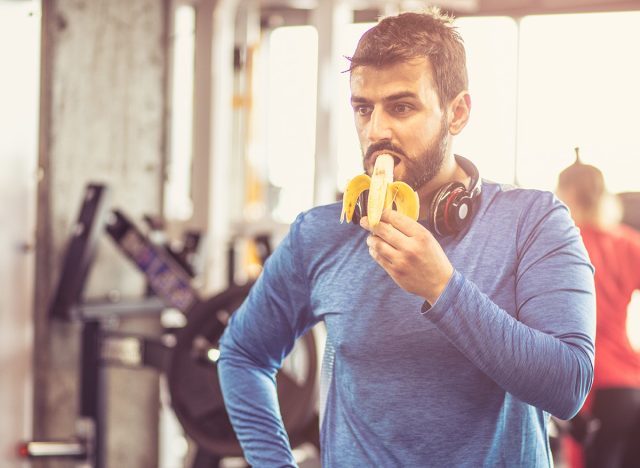
"I prefer a more regular scheduled eating with at least three to four main meals per day, spread out by around three to four hours from each other, and then I'll just add in one to two snacks or fruit between my meals when I'm the most hungry," he continues. "Just keep in mind that your body will need time to adjust if you change your eating schedule. But if done properly, you should feel improved and consistent levels of energy throughout your whole day."
RELATED: Stop These 20 Habits and Watch the Pounds Melt Away
Where You Eat Matters Too
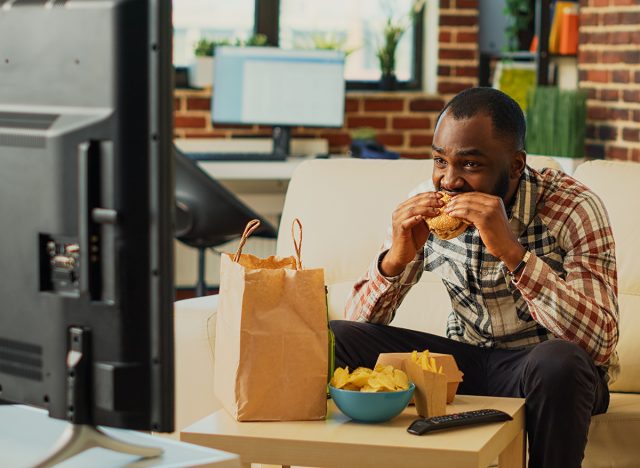
"Speaking about when you eat, did you know that where you eat also matters? This study, published in 2021, analyzed the food environments of over a thousand households. It found that one of the strongest predictors of being overweight was eating meals in front of a TV," he reveals.
Also, Slow Down Your Eating
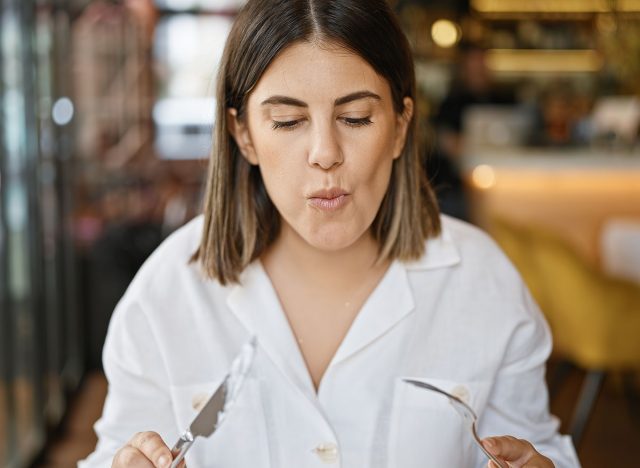
"In addition to this, a few other interesting studies have shown that slowing down your meal by taking more bites, using chopsticks, or eating with small utensils all has a powerful effect on reducing hunger and potentially boosting fat loss," he notes.
Make Small Changes at a Time
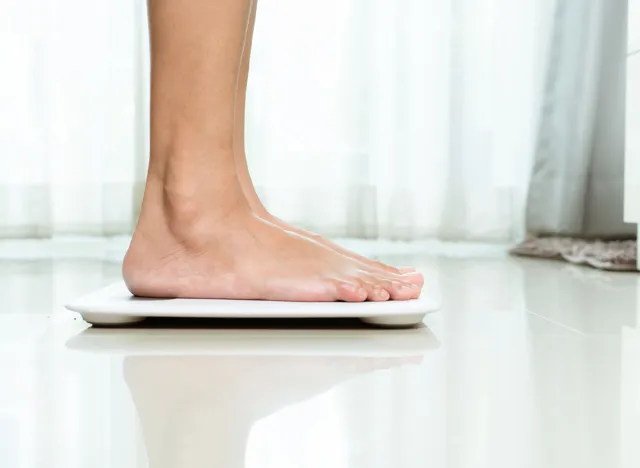
"Sure, bodybuilders and hardcore fitness guys like myself have no problem losing fat fast if needed, but you'll make way more progress making just small changes at a time and aiming to lose even just half a pound of fat every single week consistently, rather than losing a pound or two on some weeks and then gaining it all back again on other weeks," he says.
RELATED: Top 8 Superfood Breakfasts You Should Eat Every Day to Lose Weight
Create a Diet You Can Enjoy

"But just keep in mind that you will mess up at some point. Maybe you'll binge eat really bad one night, or maybe you'll have a cheat meal gone wrong, and that's okay. It's happened to me countless times. One meal or even a whole day of eating junk won't ruin your progress, but if you find yourself cheating on your diet too often, then that's often a sign that you need to make it more enjoyable," he says. "Create a diet you actually enjoy because that's what you'll be more likely to stick to in the long run." And if you enjoyed this article, take advantage of these 15 Quick Ways to Lose Body Fat Percentage in a Week.




